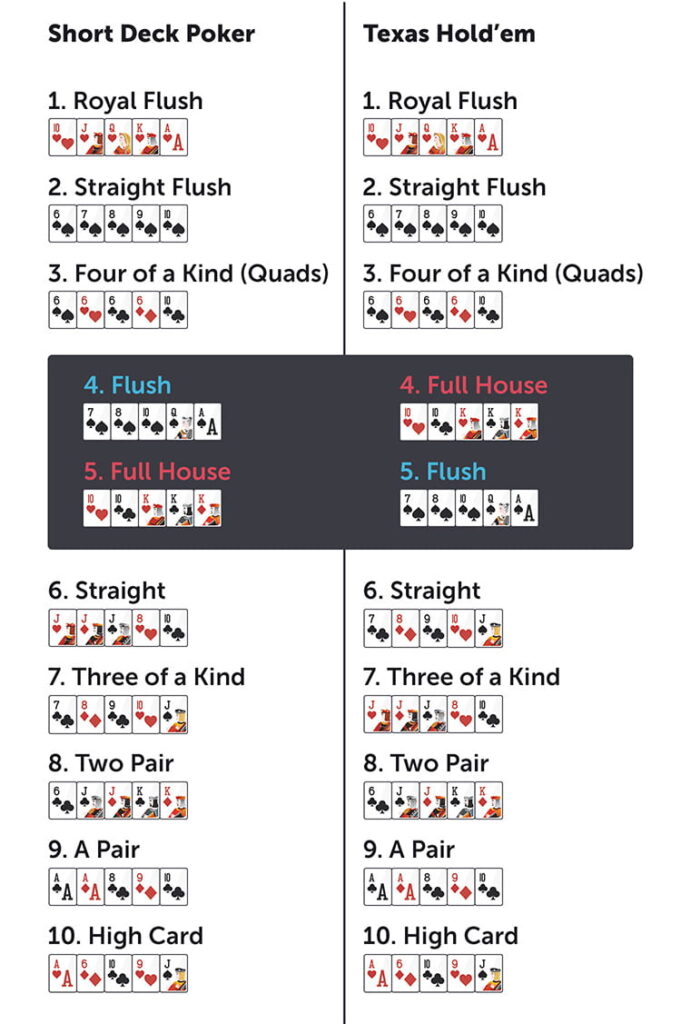Last Updated: 4 February 2026
Full Short Deck Poker Guide: Rules, Hand Ranks & Strategy
Learn Short Deck Poker with this comprehensive guide. Discover rules, strategy, hand rankings, and tips to master the Six+ Hold’em variant.
GuidesShort Deck poker, also known as Six Plus Hold’em, is a high-octane twist on Texas Hold’em that’s captivating poker players around the globe. This action-packed game uses a 36-card deck, removing the 2s, 3s, 4s, and 5s, creating larger hands and closer equities.
If you’re ready to experience a faster poker format, this guide is for you. Let’s walk you through the essentials of Short Deck Poker, including rules, hand rankings, and winning strategies.
What is Short Deck Poker?
Picture this: You’re sitting at a poker table, but instead of the usual 52-card deck, you’re playing with just 36 cards. No, the dealer hasn’t gone rogue – this is Short Deck Poker. It’s like Texas Hold’em went on a diet and came back leaner, meaner, and ready to party.
In Short Deck Poker, the cards from deuce to five are removed from the deck. What’s left is a high-octane game where the lowest card is a six (though the Ace can also be used as a 5 in straights). The result? More action, bigger hands, and enough adrenaline to make even the most stoic poker face break into a grin.
First introduced in Macau’s high-stakes poker rooms, Short Deck quickly gained traction among professional players like Phil Ivey and Tom Dwan. The game’s popularity soared with its inclusion in the Triton Poker Series, eventually making its way into the World Series of Poker (WSOP) in 2019.

How is Short Deck Different from Other Kinds of Poker?
Short Deck Poker may seem like a trimmed version of Texas Hold’em, but the differences significantly impact strategy and gameplay. Removing the lower-value cards (2s through 5s) changes hand probabilities, making certain hands more valuable and altering traditional rankings. Below is a comparison highlighting the core differences between Short Deck Poker and Texas Hold’em:
| Feature | Short Deck Poker | Texas Hold’em |
| Deck Size | 36 cards (6 through Ace) | 52 cards (2 through Ace) |
| Hand Rankings | Flush beats Full House | Full House beats Flush |
| Straight Example | A-6-7-8-9 (Ace is acting as a 5) | A-2-3-4-5 |
| Ante/Blinds | Ante-based with button blind | Small and Big Blinds |
| Chances of a Set | Higher (due to fewer cards) | Lower (due to more cards) |
Rules of Short Deck Poker Players Must Know
Short Deck Poker follows the basic structure of Texas Hold’em but with a few critical differences. The game uses a 36-card deck (6 through Ace), and the ranking of hands is adjusted to reflect the new deck composition.
Key Rules:
- Each player receives two hole cards.
- The community consists of five cards (flop, turn, river).
- A flush outranks a full house.
- Aces can be high or low and can complete a straight by substituting as a 5 (A-6-7-8-9).
- Ante betting structures are often used, with players contributing antes before the hand begins.
Hand Rankings in Short Deck Poker
Short Deck Poker uses familiar hand rankings from Texas Hold’em, but with a twist – the reduced deck size changes the odds, making certain hands more common. As a result, flushes rank higher than full houses in standard play. Here’s the official order from strongest to weakest:
- Royal Flush – (A♠ K♠ Q♠ J♠ 10♠) The ultimate unbeatable hand.
- Straight Flush – (J♦ 10♦ 9♦ 8♦ 7♦) Five consecutive suited cards.
- Four of a Kind – (K♣ K♠ K♥ K♦ 7♠) Four cards of the same rank.
- Flush – (K♠ Q♠ 9♠ 8♠ 7♠) Five cards of the same suit, stronger than a full house.
- Full House – (Q♦ Q♠ Q♥ 9♣ 9♠) Three of a kind plus a pair.
- Straight – (A♠ K♦ Q♣ J♥ 10♠) Five consecutive cards of any suit.
- Three of a Kind – (K♠ K♦ K♣ J♥ 9♠) Three cards of the same rank.
- Two Pair – (A♠ A♦ K♣ K♠ 10♥) Two sets of pairs.
- One Pair – (Q♠ Q♦ A♣ J♠ 8♥) A single pair.
- High Card – (A♠ K♦ Q♣ J♥ 9♠) No matching hands; highest card wins.

Alternate Variations: Some versions rank full houses higher than flushes, though this is less common in mainstream play.
How to Play Short Deck Poker – Step-by-Step Guide
Alright, now that we’ve covered the basics, let’s dive into the how – as in, how to actually play this adrenaline-pumping game. Don’t worry, if you can handle Texas Hold’em, you’ve already got a head start. Here is our 5-step guide for how to play Short Deck Poker:
- Ante Up and Deal
- Each player posts an ante. The player on the button posts a larger blind, typically 2-4x the ante.
- Each player receives two hole cards.
- The Flop
- Three community cards are dealt face-up.
- Players bet, raise, or fold.
- The Turn
- A fourth community card is dealt.
- Another betting round follows.
- The River
- The final community card is dealt.
- The last round of betting takes place.
- Showdown
- If multiple players remain, the best hand wins the pot.
3 Short Deck Poker Strategy Tips to Boost Your Skill
Now that you’ve got the basics down, it’s time to level up your game.
Short Deck Poker packs a punch with unique strategies and gameplay twists. The altered deck dynamics create more action and higher variance, rewarding bold plays and sharp instincts.
To help you thrive at the tables, we’ve outlined three essential strategies that will boost your chances of success and sharpen your competitive edge.
Value Big Starting Hands
The absence of 2s, 3s, 4s, and 5s significantly shifts hand strengths. Big pairs and high-ranking cards gain immense value because the chances of hitting a lower straight or weaker hand are reduced. So, focus on premium starting hands like pocket Jacks, Queens, Kings, and Aces. Additionally, hands like K-Q or A-10 become more formidable compared to standard Hold’em.
When dealt a strong starting hand, don’t be afraid to play aggressively pre-flop. Since more players will enter pots with marginal holdings due to closer equity spreads, betting heavily with top-tier hands can isolate weaker opponents and build substantial pots.
Moreover, don’t overlook suited high cards. With flushes ranked higher than full houses, suited combinations of A-K, K-Q, or Q-J can lead to massive payoffs. Balancing aggression with caution is key, as overcommitting to middling hands can lead to unnecessary losses.
Embrace the Action
Closer hand equities create a high-action environment. All-ins and large pots are more frequent, and passive play can quickly lead to falling behind. To succeed, players must embrace the aggressive nature of the game.
Drawing hands, especially those with straight or flush potential, carry increased value. For example, hands like J-10 suited or 9-8 suited can win big pots even if they aren’t premium pre-flop holdings. Be prepared to play speculative hands more often, particularly in multi-way pots.
Additionally, capitalize on opponents who tighten up in fear of the action. Bluffing is a powerful tool, especially when representing flush or straight draws. The frequency of boards that favor drawing hands can allow for more creative plays.
Watch for Flush Draws
One of the most significant rule differences in Short Deck Poker is the hand ranking shift—flushes outrank full houses. This seemingly small adjustment dramatically influences how drawing hands are played.
Flush draws should be pursued aggressively, especially if holding two suited high cards. Betting or raising with flush draws not only builds the pot but also applies pressure on opponents who may hold strong one-pair or two-pair hands.
Paying attention to suited hole cards during pre-flop and post-flop play is vital. For example, hands like A♥ K♥ or Q♠ J♠ become valuable beyond their straight potential. Even lower flush draws, such as 10♣ 9♣, can lead to sizable wins if they hit.
However, exercise caution if the board pairs, as full houses can still prevail. Weigh the odds carefully and calculate the risk versus reward before committing large portions of your stack.
Avoid the Common Mistakes New Short Deck Players Make
Even the savviest poker sharks can find themselves floundering in the Short Deck waters. Here are some common pitfalls to watch out for:
- Overplaying Suited Hands – Suited cards are less valuable since flushes are harder to complete.
- Ignoring Position – Positional awareness is crucial for managing bet sizes and maintaining control of the hand.
- Misreading Draws – Straight draws and gut-shot draws are more valuable in Short Deck; don’t underestimate them.
- Slow Playing Big Hands – With frequent big hands, slow playing can lead to missed value. Bet aggressively when holding strong hands.
Your Seat is Waiting on CoinPoker
Here at CoinPoker, we are the go-to platform for online poker enthusiasts seeking a secure, crypto-based environment. Enjoy a wide range of poker formats, regular freerolls, and exciting promotions. While Short Deck Poker may not be in the lineup yet, our platform offers numerous opportunities to sharpen your skills and win big.
With transparency and security at the forefront, you can focus solely on your game. Plus, our welcoming bonuses and VIP perks are designed to support you on your poker journey.
Ready to elevate your poker experience? Sign up to CoinPoker now and make your poker dreams a reality.
FAQs
Short Deck Poker uses a 36-card deck, removing the 2s through 5s.
Players receive two hole cards and use five community cards to form the best hand.
The game’s fast pace and closer hand equities lead to more action and excitement.
Flushes often outrank full houses due to deck composition.
Several online poker sites offer Short Deck Poker, with platforms like Triton and WSOP featuring the game.
Explore More
Announcements
Read recent announcements from CoinPoker about new games, ambassadors, and changes to our platform.
1 PostGuides
The go-to resource for mastering poker with expert tips and strategies. Our guides will elevate your poker skill level.
60 PostsNews
Find the latest poker news and latest CoinPoker Newsletters. Get updates about games, promotions, and crypto news.
96 PostsPromotions
Find the latest CoinPoker promotions here. Explore the crypto poker world with the best poker promotions available.
1 Post
















